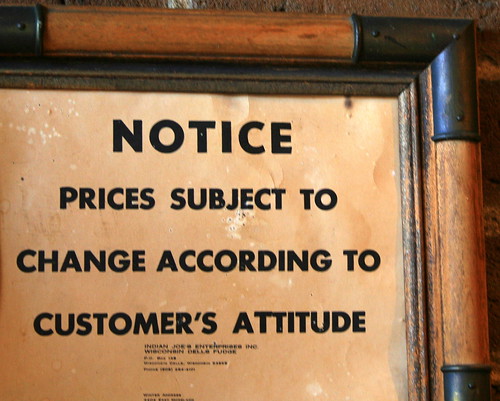
I have written in the past about the “Responsibility of the Audience,” the need for people to be critical readers as the range and democratization of information sources has brought with it a comparable range of quality of that information. Consumers of information have the power to inform themselves better by being their own journalists and casting a critical eye on their sources.
I have recently come to think about how that applies to being a customer. One of the hallmarks of the social web is the ability for consumers to complain about bad service and/or a bad product, and almost as often about the bad customer service that accompanies it. While we cannot absolve companies of the need to improve their customer service (not to mention their products and services), we can use our own personal skills to take greater responsibility for the service we do get. That washcloth may be wrung out, but you can always get a few more drops out.
Be Patient While Remaining Firm
A basic tenet is to simply keep control. It is easy to rage and rail and while that may be cathartic (especially if you get in an “I’m a blogger you know, I’m going to blog about this;” come on, admit you’ve done it, or at least thought about it), it will not solve a problem.
The other side of patience is having proper expectations. In dealing with a problem with a trip I booked through Travelocity, I came to realize, after taking several deep breaths that my original vision of waived fees was not going to work out; I did formulate what was going to be acceptable. Even better, map out beforehand what- realistically- you can expect as an outcome, and why. Consider how you map out projects at your job, and how different variables can conspire to add up to realistic expectations. That does not mean give up, but it does mean you might want to consider redrawing your line in the sand, if it will help resolve matters.
Change the Script (and Doodle in the Margins)
Not all problems follow a script, and the “CSR answers” script often leads to a dead end. Have you ever called about a product that was not working, only to be told the problem was with a component made by another manufacturer, and to please call that manufacturer who may or may not have helped you?
I ran into just that situation several years ago when setting up a wireless router in my home. I think it was a D-Link, but am not sure. I could not get it to work, and was very frustrated. The CSR (who was in India, by the way) was very polite, and we struck up a nice conversation as we went through the possible problems. No dice. Finally, he determined the issue was with my wireless card, made by another manufacturer (that actually may have been defunct at that point). Rather than let my frustration boil over, I changed the script; I asked the rep what he would do, making it clear that I had no expectations and that I knew this was out of his normal bounds. I simply played up to his personal expertise and let him off the hook if it didn’t work. He suggested a control to check in the online dashboard, and hung on while I looked. It worked. I’ll never forget that experience, and how it changed my view of how to control the situation on a customer service call.
You could argue that companies should train their CSRs to go off script and be problem solvers; that would be awesome, and I would encourage companies to do so. But really, is it easier to expect all companies to get all their reps to be that innovative, or is it easier for you to draw innovation out of the people you interact with?
Fair or not, that’s the responsibility of the customer.
